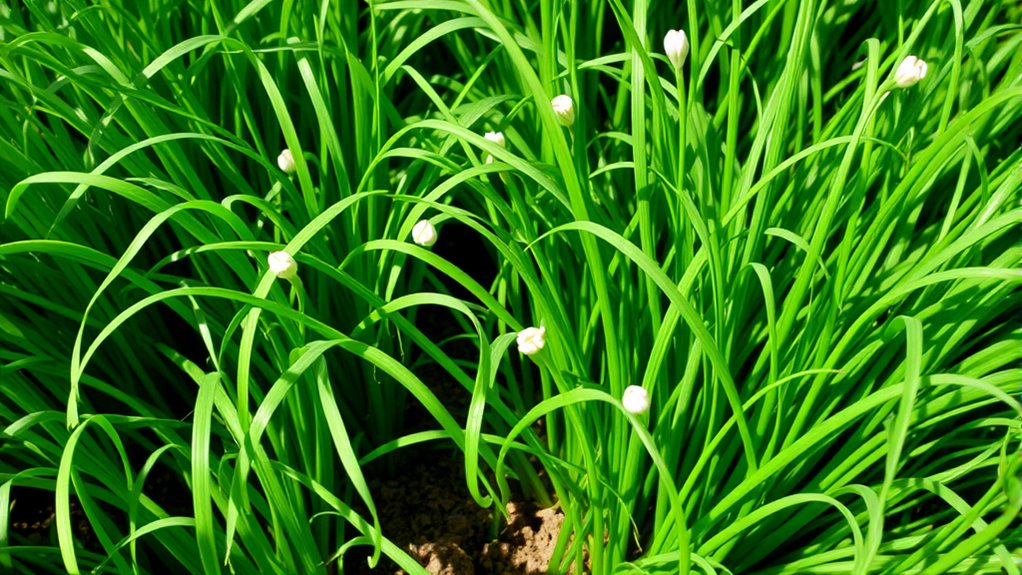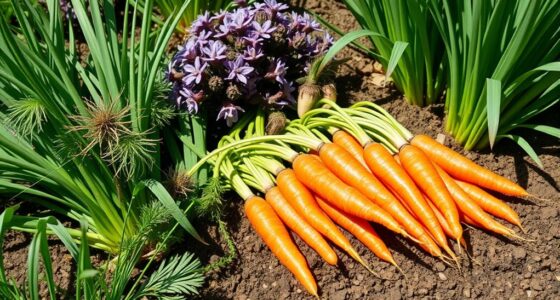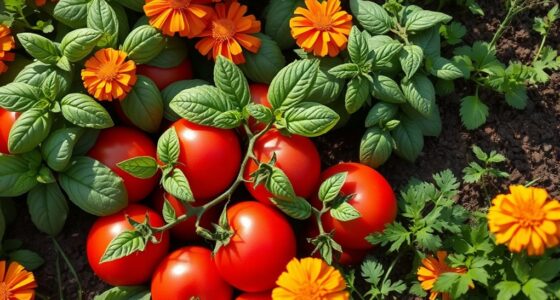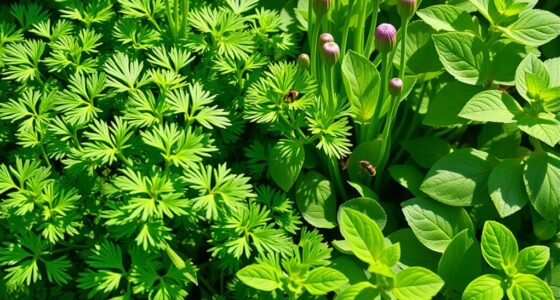A chives companion planting guide helps you maximize garden health by pairing chives with vegetables like carrots, lettuce, and tomatoes, which benefit from pest repellence and improved flavor. Combine them with herbs such as basil, parsley, and dill for extra pest control, and plant flowers like marigolds or lavender to attract pollinators. Avoid planting alliums or garlic nearby to prevent root competition and pests. Keep an eye on spacing and plant placement for thriving, balanced growth—discover more tips to boost your garden’s success.
Key Takeaways
- Grow chives with carrots, lettuce, and tomatoes to enhance flavor, repel pests, and promote healthy growth.
- Plant companion herbs like basil, parsley, and dill to attract beneficial insects and deter pests.
- Use marigolds, nasturtiums, and calendulas nearby to repel aphids, beetles, and other pests naturally.
- Avoid planting alliums like onions and garlic close to chives to prevent root competition and pest attraction.
- Space plants properly and include beneficial flowers to support pollinators and maintain a resilient garden ecosystem.
Benefits of Growing Chives With Other Plants
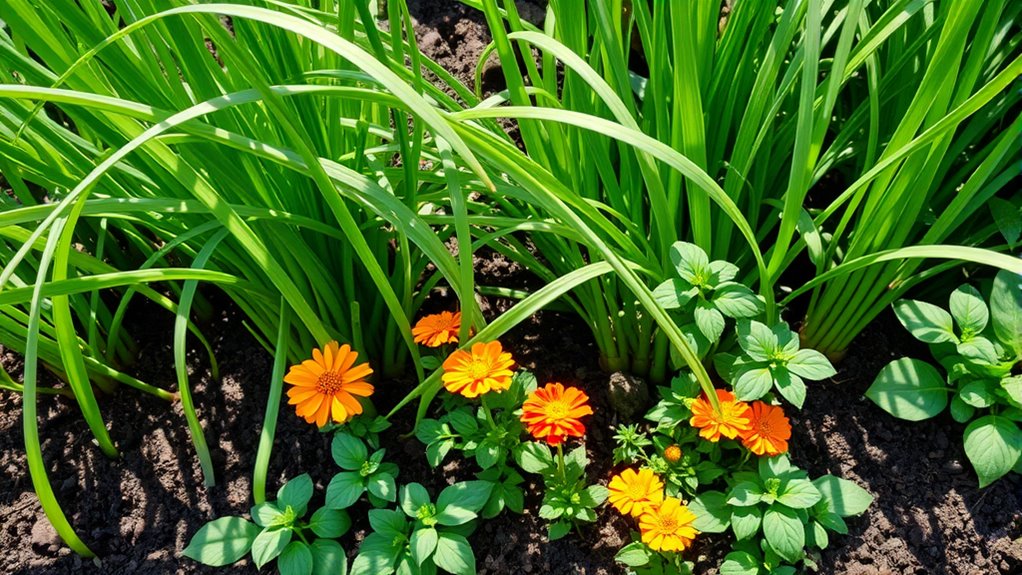
Have you ever noticed how planting chives alongside other vegetables can boost your garden’s health? Chives act as natural pest repellents, deterring aphids, Japanese beetles, and other pests from your plants. Their strong scent confuses pests and keeps them away, reducing the need for chemical treatments. Additionally, chives attract beneficial insects like pollinators and predatory bugs, which help control pests naturally. Chives also improve soil health by adding organic matter when they decompose, enriching nutrients for neighboring plants. Their presence can even enhance the flavor and growth of nearby vegetables. Incorporating companion planting benefits into your garden strategy can maximize these positive effects. Research indicates that sound vibrations are believed to enhance cellular regeneration and overall health, which can be beneficial for your soil and plants. Furthermore, microbial activity in the soil can be stimulated by the presence of chives, promoting a more resilient garden ecosystem. For example, certain plant roots release substances that stimulate soil microbiome diversity, further supporting plant health. Proper soil management also plays a crucial role in supporting these beneficial interactions, leading to healthier plant growth. Overall, integrating chives into your garden creates a healthier, more balanced ecosystem that supports vigorous plant growth while minimizing pests and disease.
Best Vegetables to Pair With Chives
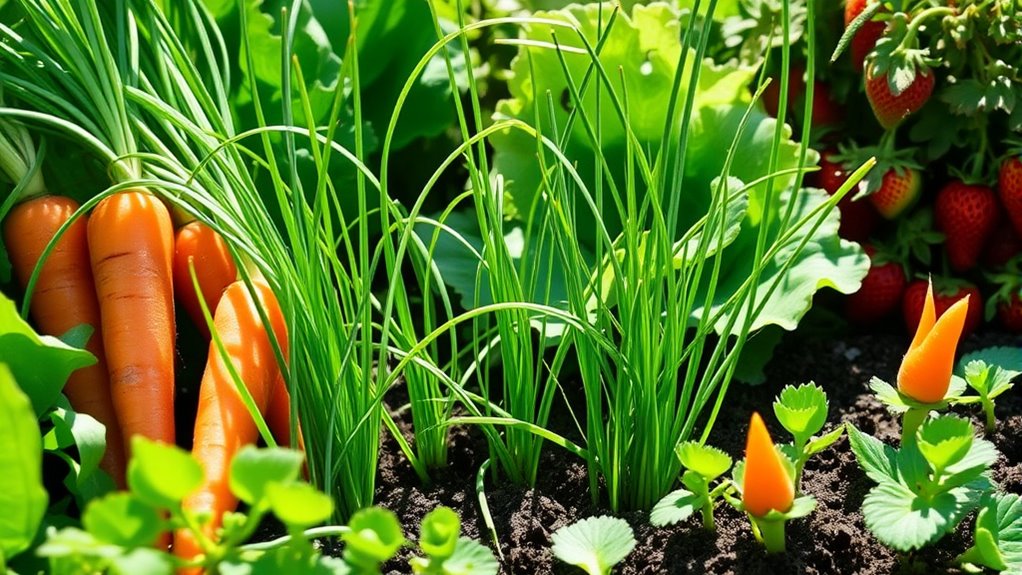
Pairing chives with certain vegetables can enhance your garden’s productivity and health. Chives work well with vegetables like carrots, lettuce, and tomatoes. Their presence can help repel pests such as aphids and carrot flies, protecting your crops naturally. Carrots benefit from chives’ ability to deter pests and may develop better flavor when grown nearby. Lettuce also benefits, as chives can help keep away insects that target leafy greens. Tomatoes thrive alongside chives because they share similar watering needs and chives can help deter mites and aphids. Incorporating chives with these vegetables creates a pest-resistant environment, encourages healthy growth, and boosts overall yield. Additionally, understanding how self-watering planters support consistent moisture can help optimize plant health and reduce maintenance. Proper plant spacing is essential to prevent overcrowding and ensure each plant receives adequate nutrients and space for optimal growth. Utilizing integrated pest management strategies can further improve your garden’s resilience against pests and diseases. Maintaining soil health through composting and crop rotation also enhances the effectiveness of companion planting.
Herbs That Complement Chives Well
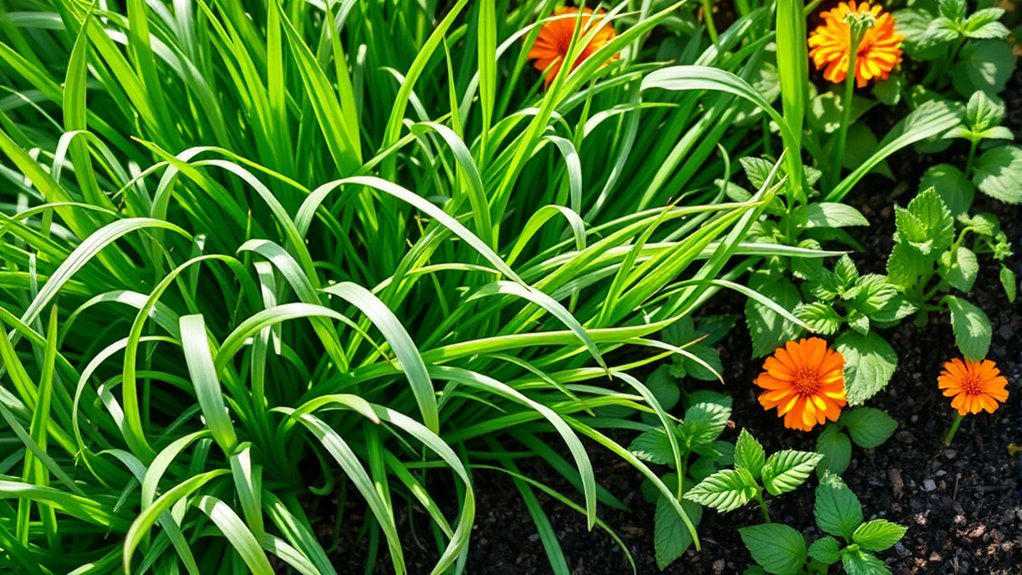
Building on how chives can improve your vegetable garden, incorporating complementary herbs can further enhance growth and flavor. Herbs like basil, parsley, and dill work well alongside chives because they attract beneficial insects and repel pests. Basil’s aromatic leaves can help deter aphids, while parsley attracts predatory insects that keep pest populations in check. Dill attracts ladybugs and other natural pest controllers, providing a balanced ecosystem. Additionally, these herbs share similar watering and sunlight needs, making them easy to grow together. Plantting them nearby not only boosts overall plant health but also enhances the flavor profile of your herbs and vegetables. Companion planting with these herbs creates a resilient, productive garden that benefits from natural pest management and increased yields. Incorporating vibrational energy into your gardening practices can also support healthier plant growth and stronger plant vitality.
Flowers and Ornamental Plants to Grow Near Chives
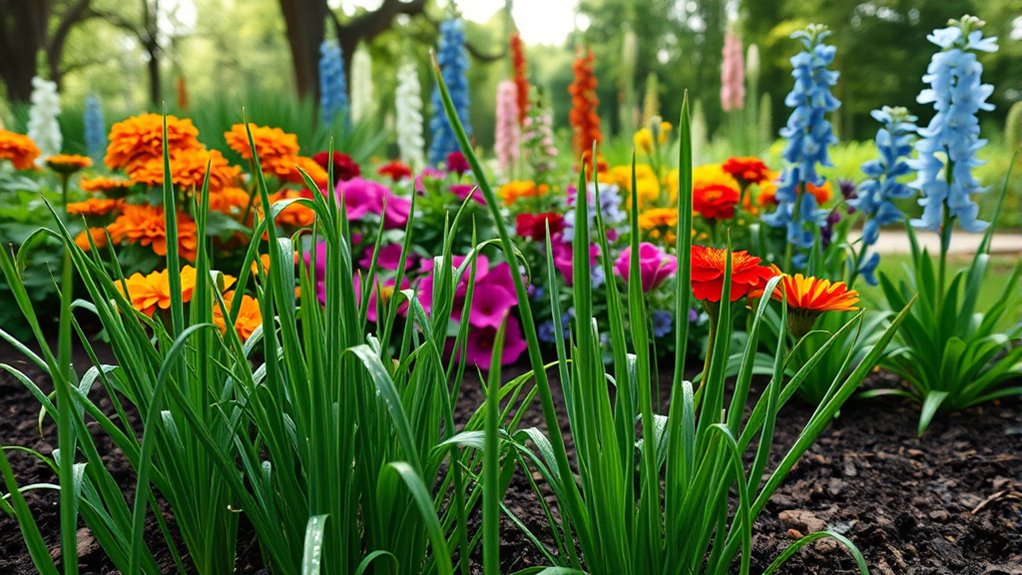
Planting flowers and ornamental plants near your chives can attract beneficial pollinators that help your garden thrive. These plants also boost your garden’s beauty, creating a more inviting space. Plus, they can help prevent pest problems by acting as natural repellents or distractions. Incorporating best anime movies into your garden planning can inspire a creative and vibrant landscape.
Attract Beneficial Pollinators
Have you considered how adding certain flowers and ornamental plants near your chives can boost pollinator visits? Bright, fragrant blooms like marigolds, zinnias, and calendulas attract bees, butterflies, and other pollinators essential for a healthy garden. These plants provide nectar and pollen, encouraging pollinators to frequent your chives and surrounding plants. By planting these nearby, you create a supportive environment that increases pollination rates, leading to better chive flowering and seed production. Additionally, diverse flowers can extend bloom times, ensuring pollinators stay active throughout the season. Choose plants that thrive in your climate and integrate them into your garden layout for maximum appeal. Incorporating garden layout strategies can also enhance pollinator visitation. Supporting pollinator populations is crucial for the overall health of your garden and can lead to more abundant harvests of your chives. Creating a diverse plant environment can also help protect pollinators from pesticide exposure, contributing to their health and longevity. Attracting beneficial pollinators ultimately supports your garden’s overall health and productivity.
Enhance Garden Aesthetics
Adding attractive flowers and ornamental plants near your chives not only benefits pollination but also elevates your garden’s visual appeal. Bright blooms create a vibrant, inviting space that draws the eye. Consider planting flowers with contrasting colors or unique shapes to add variety. These plants can also serve as focal points or borders, making your garden feel more curated. Incorporate a mix of textures and heights for depth and interest. Additionally, selecting plants that are compatible with chives can further enhance your garden’s overall health and productivity. Below are some ideal choices:
| Flower/Ornamental Plant | Benefits |
|---|---|
| Marigolds | Bright colors, repel pests |
| Nasturtiums | Edible flowers, attract pollinators |
| Calendula | Hardy, cheerful blossoms |
| Lavender | Fragrant, adds calming hues |
| Coneflowers | Long-lasting blooms, attract bees |
Prevent Pest Problems
Growing the right flowers and ornamental plants near your chives can considerably reduce pest problems in your garden. Marigolds are excellent companions because they repel aphids, nematodes, and whiteflies. Nasturtiums act as trap crops, drawing pests away from your chives and preventing infestations. Calendula releases compounds that deter various insects, including beetles and aphids. Lavender and rosemary emit strong scents that repel moths, flies, and mosquitoes, keeping pests at bay. Chrysanthemums contain pyrethrins, natural insecticides that help control a range of pests. Additionally, understanding integrated pest management strategies can further enhance pest control efforts. By choosing these plants, you create a natural barrier that confuses or repels pests, reducing the need for chemical treatments. Incorporating these flowers and ornamentals not only protects your chives but also enhances your garden’s overall health pest control strategies.
Plants to Avoid Planting Close to Chives
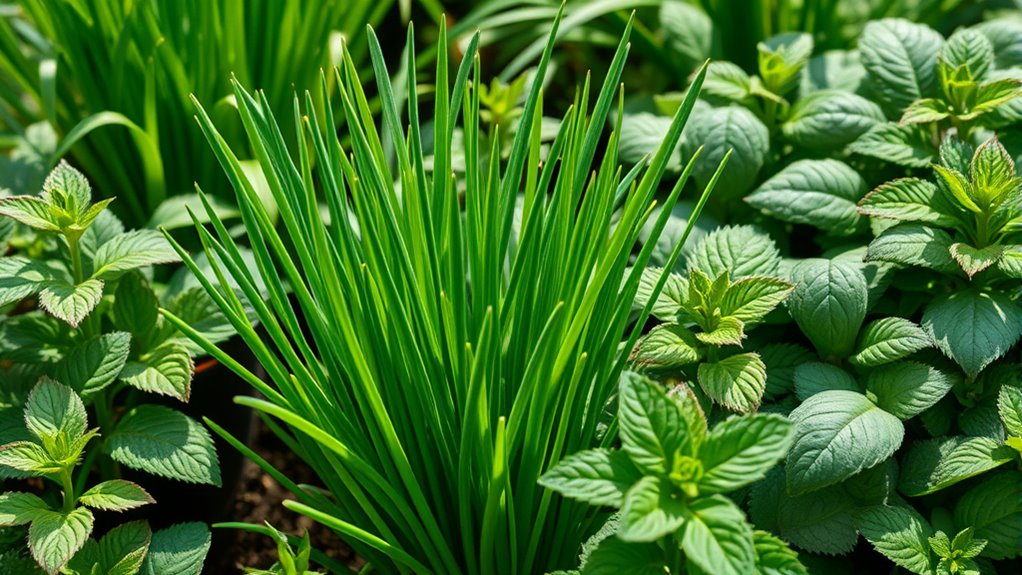
You should avoid planting alliums or other closely related crops near your chives, as they can compete for resources and cause conflicts. Additionally, some plants may attract pests that could harm your chives or spread disease. Being mindful of these risks helps you maintain a healthy, productive garden. Recognizing the importance of plant compatibility can further enhance your gardening success. Introducing companion planting principles can help you select the best partners for your chives and promote a thriving garden ecosystem.
Alliums and Chives Conflicts
While chives and other alliums are generally good companions in the garden, certain alliums can cause conflicts when planted too close together. Some alliums, like garlic and onions, may compete for nutrients and space, which can hinder chive growth. Additionally, their strong flavors and scents might create chemical signals that interfere with each other’s development or pest resistance. Planting similar alliums too close can also increase the risk of disease spread, such as fungal infections, due to shared vulnerabilities. Proper spacing between different allium species helps prevent these issues and promotes healthy growth for all plants involved. To avoid these conflicts, keep different allium species adequately spaced and avoid mixing certain varieties in the same bed. This ensures each plant can grow healthily without competing or attracting unwanted pests and diseases. Maintaining adequate plant spacing also helps reduce the likelihood of shared pest or disease transmission between alliums. Recognizing the specific growth habits of each allium type can further enhance your planting success.
Root Competition Concerns
Certain plants can cause root competition issues when planted too close to chives, leading to stunted growth and reduced yields. These plants aggressively compete for water and nutrients, depriving chives of essential resources. To avoid this, steer clear of the following:
- Root vegetables like carrots and parsnips – their deep, invasive roots can invade chives’ root zone.
- Alliums such as onions and garlic – they have extensive root systems that compete for nutrients.
- Perennials like rhubarb – their aggressive spreading roots can overshadow chives and limit growth.
Pest Attraction Risks
Planting certain species too close to chives can increase the risk of pest attraction, which may lead to infestations that damage your herbs. For example, plants like onions and garlic can attract onion maggots and thrips, pests that also target chives. Avoid planting members of the Allium family directly next to your chives, as pests may spread easily between them. Additionally, flowering plants such as fennel and dill attract aphids and caterpillars, which can migrate to your chives. These pests can weaken your herbs or spread diseases. To protect your chives, keep incompatible plants at a safe distance and monitor for signs of pest activity regularly. Proper spacing and plant selection help minimize pest risks and promote healthier growth.
Tips for Designing a Chives-Friendly Garden Layout
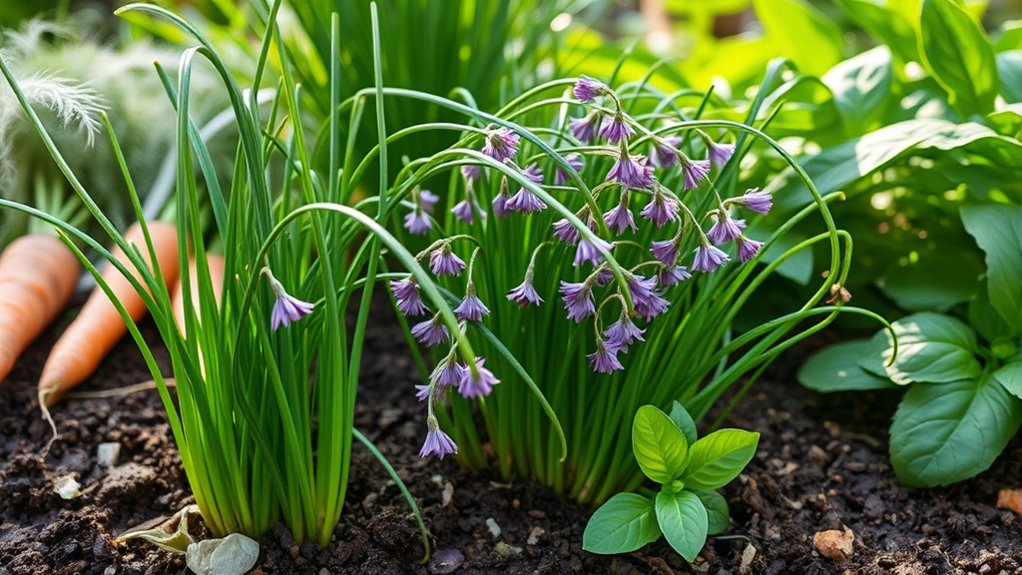
Designing a chives-friendly garden layout starts with choosing the right spot that receives full sun and has well-draining soil. This ensures healthy growth and prevents root rot. To optimize your layout, consider these tips:
Choose a sunny, well-drained spot for healthy, thriving chives.
- Group chives with compatible plants to maximize space and promote healthy interactions.
- Arrange taller plants behind or away from chives to avoid shading them.
- Create clear pathways for easy maintenance and harvesting, keeping chives accessible.
Position chives near other herbs like dill or parsley to encourage beneficial companions. Avoid placing them close to plants that require different water or soil conditions. By planning your layout thoughtfully, you’ll boost chives’ growth and create a thriving, harmonious garden environment.
Companion Planting Strategies for Pest Control
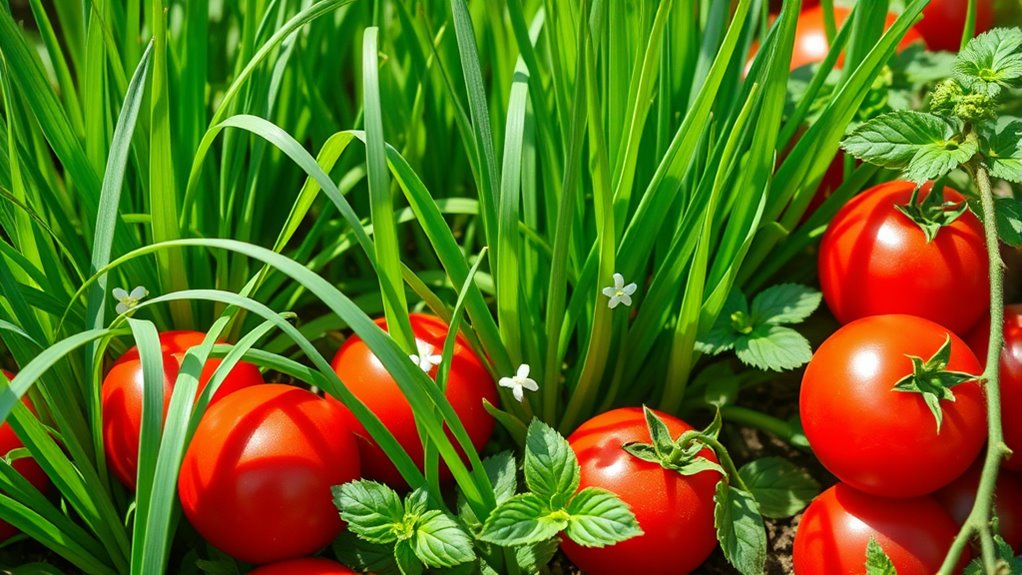
Companion planting offers an effective natural method to control pests in your chives garden. By strategically placing certain plants nearby, you can deter common pests like aphids, onion flies, and thrips. For example, planting marigolds around your chives releases compounds that repel pests and attract beneficial insects. Nasturtiums are another great companion—they attract aphids away from your chives and attract predatory insects. Basil also works well; it masks the scent of chives, confusing pests and reducing their interest. Additionally, planting carrots or parsnips nearby can help attract beneficial insects that prey on pests. Regularly monitoring your garden and adjusting plant placements based on pest activity will help you create a resilient, pest-resistant chives garden without relying on chemicals.
Maintaining a Balanced and Healthy Chives Garden
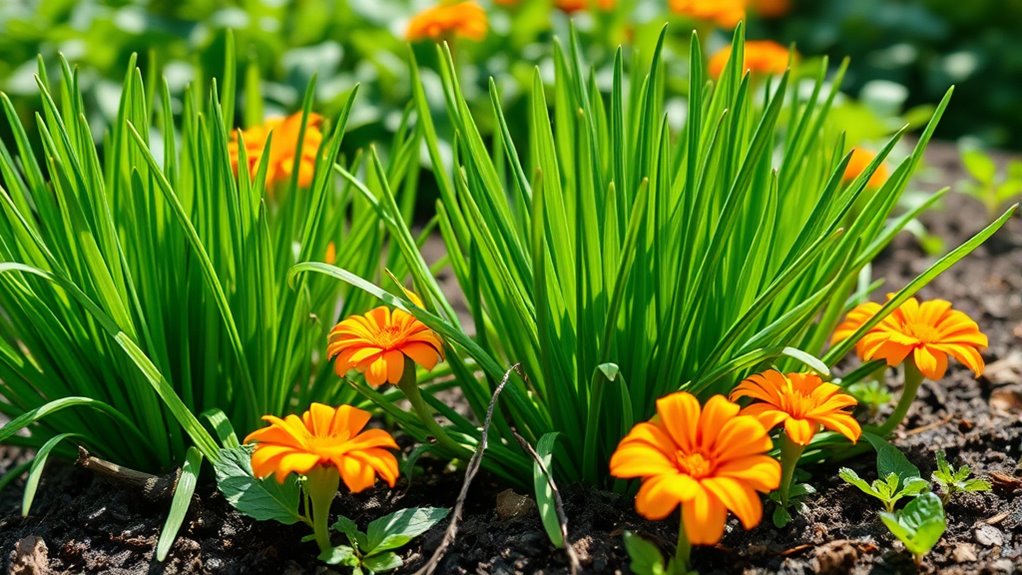
To maintain a balanced and healthy chives garden, you need to focus on proper watering, soil management, and regular maintenance. Consistently water your chives to keep the soil moist but not soggy, especially during dry spells. Use well-draining soil enriched with organic matter to promote healthy growth and prevent root rot. Regularly remove weeds and dead leaves to reduce pests and disease risks.
Maintain a healthy chives garden with proper watering, soil care, and regular weed removal.
Here are three essential tips:
- Water deeply once or twice a week, adjusting for weather conditions.
- Mulch around the plants to conserve moisture and suppress weeds.
- Fertilize lightly with a balanced, organic fertilizer every few weeks.
Following these steps helps your chives stay vigorous, flavorful, and resilient.
Frequently Asked Questions
Can Chives Improve Soil Health for Neighboring Plants?
You might wonder if chives can boost soil health for nearby plants. The good news is, chives release natural compounds that can help repel pests and prevent diseases, creating a healthier environment. Their roots also add organic matter as they grow and decompose, enriching the soil. By planting chives alongside your vegetables and herbs, you support a balanced ecosystem that promotes overall soil vigor and plant health.
Are There Specific Climate Conditions Best Suited for Chives Companion Planting?
Imagine a garden where every plant dances in harmony. You’ll find chives thrive best in cool, well-drained soil with full sun or partial shade. They prefer temperatures between 55-75°F (13-24°C). If you plant them in mild climates, they flourish and help nearby veggies resist pests. So, guarantee your climate matches these conditions for the best results when companion planting with chives.
How Does Chives Planting Affect Pollinator Activity in the Garden?
Planting chives benefits your garden by attracting pollinators like bees and butterflies, which helps improve pollination for nearby plants. Chives produce fragrant purple flowers that draw these helpful insects, increasing pollinator activity in your garden. As pollinators visit, they carry pollen from flower to flower, boosting your overall plant health and yields. So, including chives in your garden actively supports pollinator populations and enhances your garden’s productivity.
What Are Common Mistakes to Avoid in Chives Companion Gardening?
Imagine your garden as a symphony, and chives are the subtle yet essential melody. To keep it harmonious, avoid overcrowding chives, which can choke their growth and attract pests. Don’t plant them too close to garlic or beans, as they can compete for nutrients. Also, neglecting regular watering or harvesting can turn this gentle tune into a discordant mess. Mind these pitfalls to let your chives thrive.
Can Chives Be Grown Successfully in Container Gardens With Companions?
You can definitely grow chives successfully in containers with companions. Choose a pot with good drainage and use quality soil. Pair chives with plants like carrots, tomatoes, or lettuce to enhance growth and deter pests. Keep the container in a sunny spot, water regularly, and guarantee proper spacing. With attentive care, your container garden will thrive, and your chives will flourish alongside their companion plants.
Conclusion
By choosing the right companions for your chives, you create a garden that’s truly a symphony of growth, flavor, and beauty. You’ll find that your chives thrive like never before, turning your garden into a lush paradise that’s almost too good to be true. Remember, strategic planting isn’t just about avoiding pests or boosting growth—it’s about crafting a vibrant ecosystem where every plant plays a crucial role. Embrace these tips, and watch your garden flourish beyond your wildest dreams.
